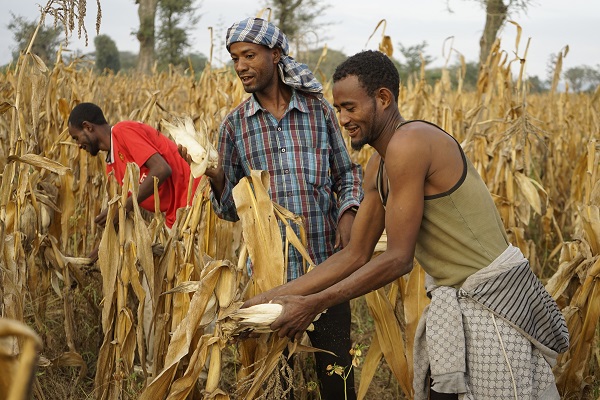Mexico City, Mexico
March 30,2 017
 Farmers Nuri Bekele, Tefera Tamirat & Melaka Bekele harvest drought tolerant maize in Ethiopia. Photo: P. Lowe/CIMMYT
Farmers Nuri Bekele, Tefera Tamirat & Melaka Bekele harvest drought tolerant maize in Ethiopia. Photo: P. Lowe/CIMMYTMarker-assisted recurrent selection (MARS) is helping maize breeders develop higher yielding and drought-tolerant improved varieties faster than ever before, according to a recent study from scientists at the International Maize and Wheat Improvement Center (CIMMYT).
“With conventional breeding, it often takes up to 7-8 years for varieties to reach farmers,” said Yoseph Beyene, a CIMMYT maize breeder working with the CGIAR Research Program on Maize (MAIZE) and one of the authors of the study. “With MARS, those varieties take only 5 years to reach farmers, and display greater genetic gain, even under drought conditions”
The study “Improving Maize Grain Yield under Drought Stress and Non-stress Environments in Sub-Saharan Africa using Marker-Assisted Recurrent Selection” found that by using MARS, breeders can develop new maize varieties farmers need faster and cheaper than conventional breeding methods by reducing the breeding cycle, showing scientists which varieties have desired traits at a quicker rate. This study focused on developing improved, drought-tolerant and high-yielding tropical maize varieties for areas such as sub-Saharan Africa that suffer from frequent drought and an unpredictable climate.
“Climate change is changing environments faster than agriculture can naturally adapt,” said Beyene. “It is crucial that farmers are able to access drought-resistant maize varieties as quickly as possible so that they can adapt to these new conditions,” he said.
MARS also dramatically cuts costs by using genotypic data to predict the best maize varieties before planting them. Previously, breeders would have to visually examine and select the best maize varieties every year.
The study found that MARS can be used to improve maize varieties in both drought and optimum environments throughout sub-Saharan Africa, where it is the most important staple food for over 300 million people. The study used MARS to estimate the genetic gain for 10 biparental tropical maize populations and found that overall, the grain yield for the 10 populations increased by 105 kilograms (kg) per hectare per year under well-watered and 51 kg per hectare per year under water-stressed conditions using MARS. The subsequent generations of test crosses were found to have significantly greater grain yields than their parents and commercial checks, suggesting that MARS has excellent potential for increasing genetic gain under both drought and optimum environments in sub-Saharan Africa.
Over 1,000 improved maize lines, including 352 doubled-haploid lines, have been developed from each cycle of the 10 biparental populations used in this study, and tested in multi-location trials. Several hybrids were derived using lines developed through MARS and pedigree methods. The best hybrids from each population are currently under national performance trials and are expected to be released soon for commercialization in sub-Saharan Africa. CIMMYT is one of the first research organizations to apply this technology to maize breeding specifically for the needs of smallholder farmers.
This study was implemented under the Water Efficient Maize for Africa (WEMA) project, supported by the Bill and Melinda Gates Foundation, the Howard G. Buffet Foundation and the U.S. Agency for International Development (USAID).
Read the study “Performance and grain yield stability of maize populations developed using marker-assisted recurrent selection and pedigree selection procedures” published in Euphytica (2016) 208:285–297 for more information.